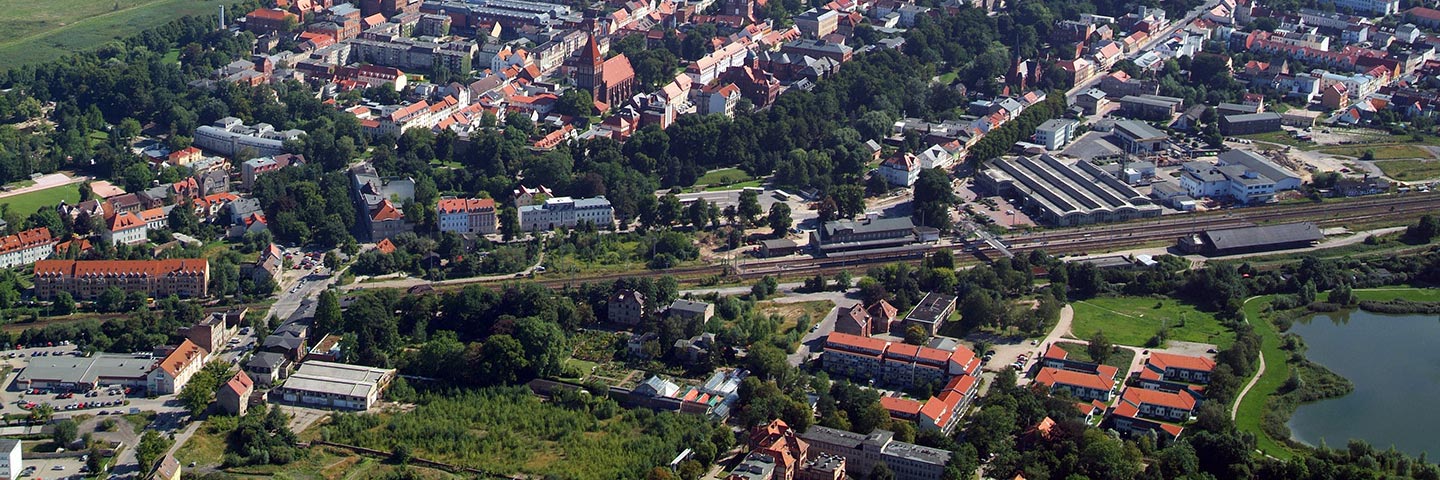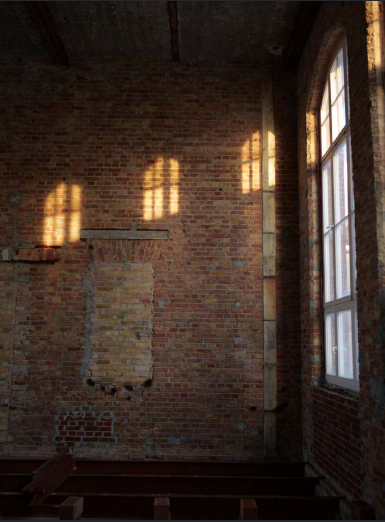News/All pieces
Biodiversity - how to save it?
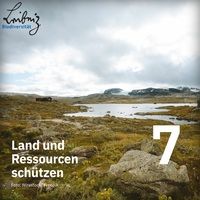
10 must knows from the world of research
Good news: There are only six years left to achieve the biodiversity targets, but we can do a lot to effectively conserve biodiversity at local, national and European level, in society and in politics! 64 scientists have compiled their ideas in the new report of the Biodiversity Research Network, coordinated by the Leibniz Association. Peatlands are mentioned right at the top (the Greifswald Mire Centre and the University of Greifswald also contributed to this), as their conservation helps to combat both the climate crisis and species loss.
In fact, only a small part of global biodiversity is understood so far. The report therefore recommends focusing on the functioning of entire ecosystems rather than individual species. Environmental measures can thus become more sustainable. The "10 must-knows from biodiversity research" provide facts for a National Biodiversity Strategy 2030, which is currently being developed. This will enable the German government to implement the 23 global biodiversity targets agreed by the member states of the United Nations at the World Conference on Nature in December 2022.
25 years of paludiculture
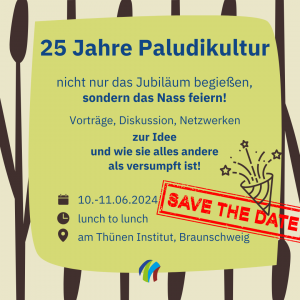
#savethedate
07/03/2024 The word paludiculture was born 25 years ago. A "simple" word was needed for an entire concept: rewetting drained moorland to stop the release of greenhouse gases and ... to continue using it in a new, sustainable form of agriculture. It was made up of two Latin words: palus for swamp and cultura for cultivation. A lot has happened since then: Pioneers have tried out paludiculture, research projects have looked at various aspects from sowing to certificates, politicians are looking into it and companies are beginning to discover paludiculture as a market. This development will be celebrated at the anniversary celebration on June 10-11 (lunch to lunch) in Braunschweig. The PaludiZentrale project, jointly organized by the Thünen Institute, the University of Greifswald and the Succow Foundation, invites you to lectures, excursions and intensive networking. The aim is to create a large Paludi network from paludiculture initiatives and projects in Germany to exchange know-how and experience.
Salon: Caspar and peatlands
Landscape painted, but also recognized?
10/02/2024 "Meadows near Greifswald" is one of the most famous works by the painter Caspar David Friedrich. It shows Greifswald and will even be on display in his home town in this year of the romantic painter' 250th anniversary, only ... it does not show meadows. The view up to the town's silhouette falls on drained peatlands, then as today. In the salon series of the Caspar David Friedrich peatland professor Hans Joosten will talk about this discrepancy, about Adelbert von Chamisso's "Untersuchung eines Torfmoors bei Greifswald", published almost at the same time (1824), and about the relationship between man and nature or landscape. The salon evening on February 22 at 7 p.m. in Ellernholzstr. 1-3 is free of charge, but registration is required.
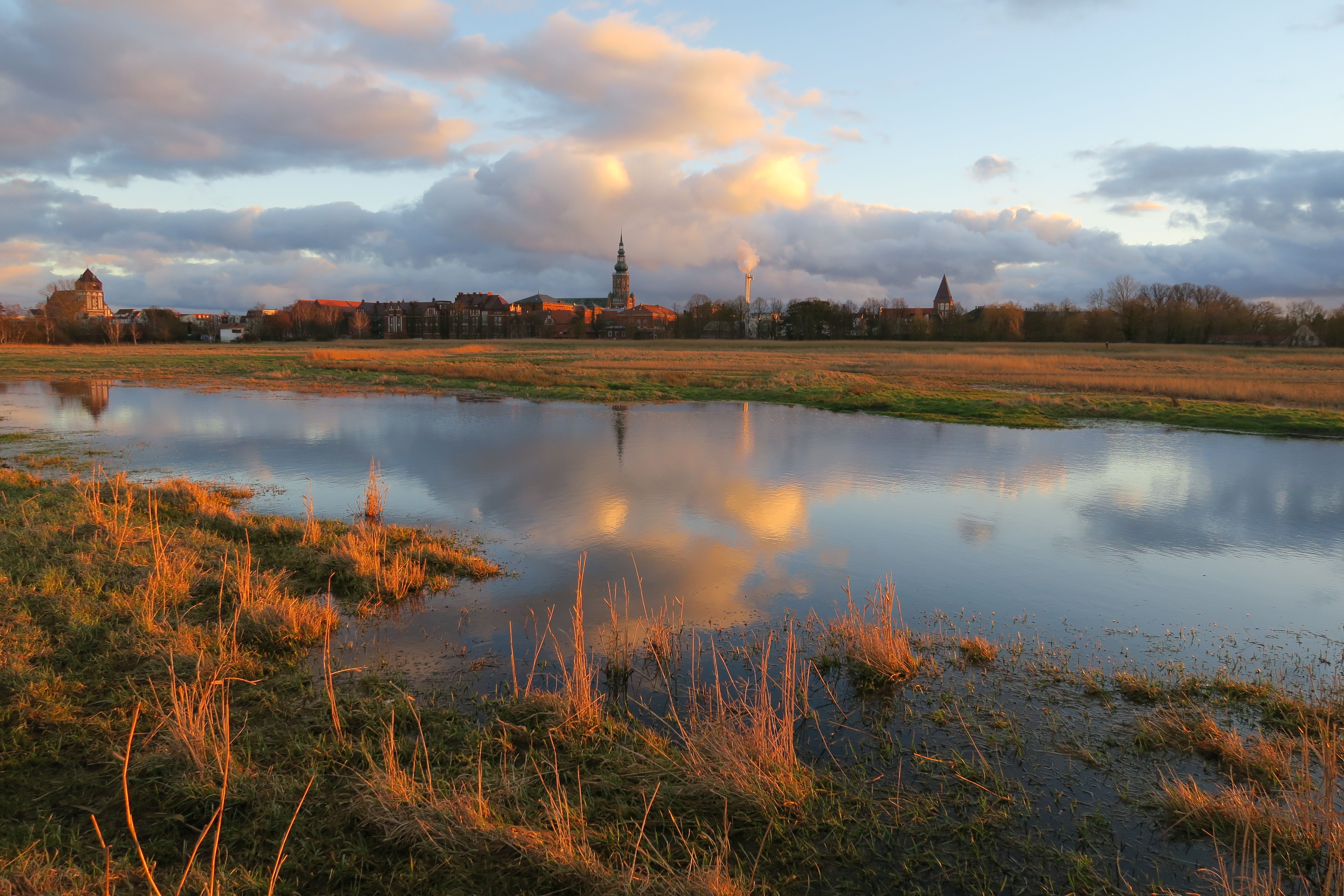
PaludiZentrale
Accompanying wet peatland use on the way to market
24/01/2024 The PaludiZentrale project bundles four recently launched model and demonstration projects (MuDs) for peatland protection and the utilization of biomass from rewetted areas for more economic paludiculture potential. Jointly managed by Thünen Institute Braunschweig and University of Greifswald, it coordinates and ensures uniform scientific data collection and knowledge exchange. It evaluates results of all aprticipating projects and develops suggestions for political and economic framework conditions as well as recommendations for action for implementation in practice. It also takes care of the transfer of knowledge. The researchers will accompany the new model and demonstration projects in raising the water level at least close to the surface on peatland areas and growing paludicultures (Latin palus: swamp, cultura: agriculture). Another task is to push the utilisation of peatland biomass towards practical use. The projects “Management and biomass utilization of wet fens in Brandenburg (WetNetBB)”, “Living Lab Teufelsmoor – climate and nature conservation-oriented wet management of peatland soils with innovative growth utilization in the Osterholz district (LivingLab Teufelsmoor)” and “Sustainable production and utilization of cattails on fen sites in Lower Saxony (RoNNi)” in Lower Saxony are concentrated on the cultivation of reed and cattail to be used e.g., in building materials or as energy source. The project “Sphagnum paludiculture as a sustainable agricultural use of raised bog soils (MOOSland)” is developing large-scale peat moss cultures for substituting peat.
The rewetting of peatland reduces emissions that are harmful to the climate. In addition, climate-friendly, even climate-positive and locally renewable raw materials can be obtained from these areas for a circular economy as a replacement for previously used petroleum-based materials. The market for biomass from wet peatlands is still small. However, the large-scale rewetting of peatlands can only be successfully implemented with an economic perspective. This perspective is crucial to promote acceptance among both land owners and users and throughout society. That is why the four MuDs and the overarching technical coordination through the PaludiZentrale project are dedicated to building value chains from cultivation to utilization. They are aimed at the building materials, paper and fiber, horticultural substrates and energy production industries. PaludiZentrale ensures exchange and advice on the development of appropriate products, raw material properties, requirements and possible hurdles not only between the MuDs, but also with industry representatives, farmers and other actors. This ensures that scientists can collect and comprehensively evaluate data using a uniform and comparable methodology. This refers to cultivation and utilization, to business and socio-economic analysis. It also concerns the monitoring of long-term economic and ecological impacts, for example how greenhouse gas exchange, soils, hydrology, water quality and biodiversity develop on the rewetted areas. The researchers derive recommendations under which conditions paludicultures and their utilization in regional value chains can be economically worthwhile. This is followed by the transfer of knowledge in politics, practice and society, which is implemented jointly by the Michael Succow Foundation and the University of Greifswald, both partners in the Greifswald Mire Centre. The Federal Ministry of Food and Agriculture (BMEL) is supporting the ten-year project with funds from the Climate Transformation Fund (KTF); the project sponsor is the Agency for Renewable Resources (FNR). In addition, the PaludiZentrale project also aims to network the MuD projects via the so-called “PaludiNetz” with four pilot projects on moorland protection that are already underway and run by the Federal Ministry for the Environment, Nature Conservation, Nuclear Safety and Consumer Protection. (BMUV) is financed by Z-U-G gGmbH as the project sponsor and will also run for ten years.
Come to the construction site
Guided tour through peatland library for WWD
23/01/2024 To mark International Wetlands Day on February 2nd, “peatland pope” Prof. Hans Joosten is taking visitors - no, not into a peatland - but to the construction site, both analogue and online! To a building where inspiration will drip from the walls and tens of thousands of books in all genres and languages will be available on one topic: peatland. Renovation work is currently underway in the former lecture hall of the "Alte Chemie (Old chemistry)" at Greifswald, as this will be the new home of the Peatland and Nature Conservation International Library PeNCIL. With 50,000 publications, this special collection is an important part of the Greifswald Mire Centre and of international importance.
In 2024, boxes of books shall move into the listed hall and be accessible barrier-free in the high room with two galleries. Statics, financing, pollution issues - there were and still are many challenges to overcome on the way from the vision of a splendid peatland library to its realisation. Hans Joosten will guide visitors through the wing, which was built at the end of the 19th century, and tell them about its history, the complex mercury decontamination and the new peatland contents. If you can't be there on WWD, you can follow a "small library construction site tour" on the Greifswald Mire Centre Facebook and Instagram accounts that day.
On site, the meeting point is in the inner courtyard of Soldmannstrasse 16 (https://www.google.de/maps/@54.0923148,13.3655688,19z?entry=ttu). As the number of participants is limited, please register at bibliothek@greifswaldmoor.de.
Some more info on World Wetlands Day
World Wetlands Day (WWD) has drawn attention to the importance of wetlands, including peatlands, every year on February 2 since 1997. On February 2nd the Ramsar Convention, the international agreement for the protection of wetlands, was adopted in 1971. Since last year, it has been recognized as an international day by the United Nations.
Due to pollution, drainage and agriculture, fires and overfishing, wetlands, including peatlands, are under threat or have already been destroyed worldwide. Yet they are guarantors of biodiversity and climate protection. Among other things, they offer people protection from drought and flooding, purify water and regulate the microclimate. In Germany, 95 % of former peatlands have been drained and are no longer recognizable as such today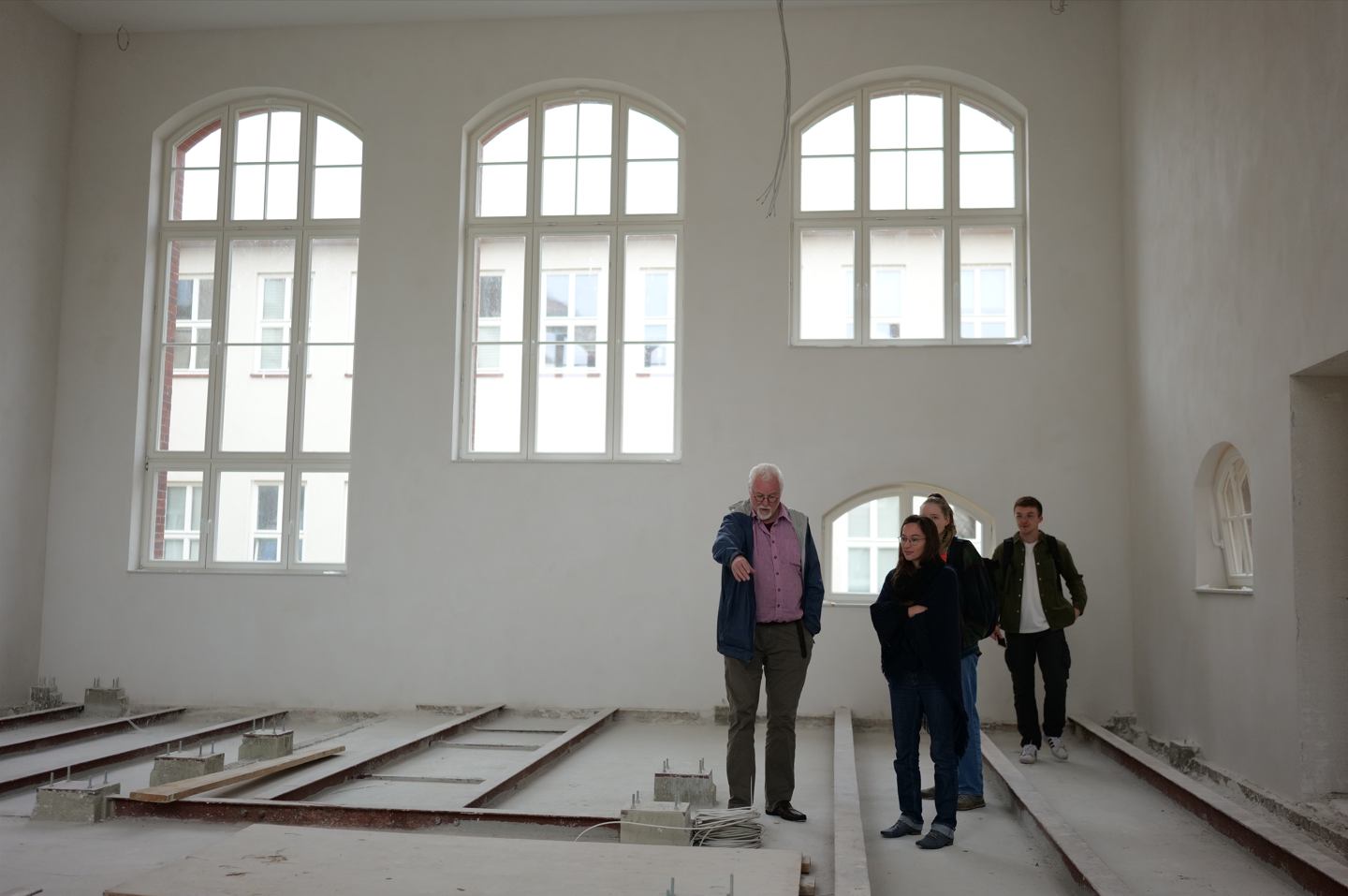
The lecture hall "Old chemistry" of Greifswald University in renovation (Photod: S. Furtak)
Start for MOOSland
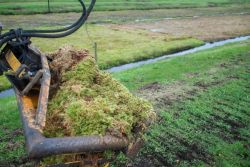
for tiny moss on large scale
11/01/2024 With MOOSland, a small plant is supposed to make a big impact – peat moss. This can be grown as a renewable raw material to replace peat in horticulture with great benefits for the climate and the economy. Over the next ten years, MOOSland wants to implement the cultivation and utilization of peat moss biomass, which has already been researched in pilot projects, on a large scale. When grassland is being rewetted for climate protection reasons, the cultivation of peat moss offers an alternative to current drainage-based agriculture. Peat moss stores water in its cells, up to 30 times its own weight. Thus, it provides a renewable raw material with similar properties to the peat formed from it. It is therefore ideal as a peat substitute. MOOSland will now help to investigate and implement peat moss paludiculture on a large scale in an ecologically, economically and socially compatible way. MOOSland is a model and demonstration project by the University of Greifswald and seven partners from Lower Saxony. The Federal Ministry of Food and Agriculture (BMEL) is supporting the project with a total of around 12.5 million euros from the Climate Transformation Fund (KTF); The project sponsor is the Agency for Renewable Raw Materials (FNR).
Wet again – but no flooding
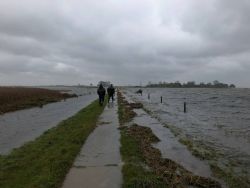
with benefit instead of damage
6/01/2024 It has rained a lot in large parts of Germany in the past few weeks. Many rivers have overflowed their banks, numerous areas are flooded, dikes are giving way and the water is threatening towns and cities. Countless rescue workers and helpers are fighting to limit the damage.
Our use of water is a key reason for the floods: water management today is designed to drain rainwater from the landscape quickly and in a controlled manner. That's why it is crisscrossed with a dense drainage network of ditches, underground drainage pipes, receiving waters, pumping stations, etc. Straightening watercourses also contributes to the water flowing away more quickly. However, when there is high rainfall, this drainage system is overloaded. The water cannot be drained away quickly enough and flooding is the result.
Modeling shows that higher winter precipitation and more heavy rain events are to be expected in the future due to climate change. It therefore becomes even more important to make flood protection safer for the future. Simply thinking about more stable and higher dikes is not enough. Rather, retention areas should be given much greater consideration because they have great importance and great potential for flood protection. Peatlands play a prominent role here. When drained, they can exacerbate flood situations if their peat is degraded and compacted. Wet peatlands, on the other hand, can absorb and store water like a sponge, thus delaying runoff. With a peat formation horizon (so-called acrotelm) in the uppermost decimetres, they are able to “breathe”, so the surface fluctuates depending on the water supply (so-called peat oscillation). Short-term flooding thus does not harm wet peatlands, even if they are used for agricultural purposes in paludiculture. This allows them to buffer flood peaks. This is also why they say “Peatland must be wet!”.
Dreaming of a wet peatland

"We wish you rewetted peatlands" for 2024
22/12/2023 Dear peatland friends, we at the Greifswald Mire Centre are “Dreaming of a wet peatland” (or many) constantly and, of course, at Christmas, too. But we are not dreaming only, but working hard to make it come true. Great thanks to everybody joining and supporting us in these efforts in the past year! For Christmas “We wish you rewetted peatlands, we wish you rewetted peatlands” and a happy new year! We’ll be continuing in 2024…
Biodiversity benefits from paludi-power
New paper in Scientific Reports of Nature
13/12/2023 Data is scarce on how biodiversity is responding to paludiculture. But a new study recently published in Scientific Reports of Nature sheds light on it. A multi-taxon study co-authored by scientists of Greifswald University, partner in the Greifswald Mire Centre, found that paludiculture can support biodiversity conservation in rewetted fen peatlands (DOI 10.1038/s41598-023-44481-0).
The scientists had investigated vegetation, breeding bird and arthropod diversity at six rewetted fen sites dominated by Carex or Typha species in Mecklenburg-Vorpommern in northeastern Germany, either unharvested, low- or high-intensity managed. Biodiversity was estimated across the range of Hill numbers using the iNEXT package, and species were checked for Red List status. It became evident that managed sites had high plant diversity, as well as Red Listed arthropods and breeding birds. Thus, they can provide valuable habitat for species even while productive management of the land continues and although these areas are not reflecting historic fen conditions.
GMC at UNFCCC COP28
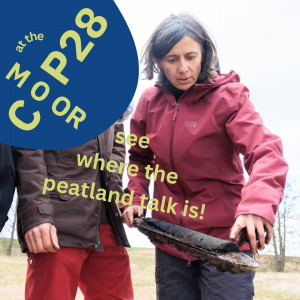
#notalkwithoutpeatlands
02/12/2023 We are, where the talk is - on peatlands, of course! Here is a collection of peatland related (side)events on this year’s world climate summit in Dubai, United Arab Emirates from 30th November - 12 December 2023. Participation via livestream is possible for most of them:
On Friday 8th December at 3–4:30pm (GMT+4) Franziska Tanneberger, one of the GMC’s directors, starts participation on the ground with joining the panel of Towards a global stocktake for peatlands and other high-carbon ecosystems: status and scaling up potential. Co-organised by Succow Stiftung, Partner in the Greifswald Mire Centre, United Nations Environmental Programme (UNEP), Wetlands International and Deutsche Bundesstiftung Umwelt (DBU), the event is hybrid and can be followed per livestream / ). The direct link will be available from the 7th December.
On Saturday 9th December, in total, there are four peatland events with GMC participation: At 10:00-11:30, an official COP28 Presidency Event discusses Enhancing food and nature linkages for climate action. It is organised by the Food and Land Use Coalition (FOLU) with COP28 Presidency, High Level Climate Change Champions, and many other organisations including Succow Foundation, partner in the Greifswald Mire Centre. Speakers include Ani Dasgupta (President and CEO, World Resources Institute WRI), H.E. Siti Nurbaya Bakar (Minister of Environment and Forestry, Indonesia), Jochen Flasbarth (Secretary of State, Ministry of Economic Cooperation and Development, Germany), Bruno Pozzi (Deputy Director Ecosystems Division Director, UNEP) and Franziska Tanneberger.
At 1:00-2:30pm (GMT+4) Climate change mitigation through peatland restoration is the topic at the United Nations Office for Project Services (UNOPS) hub. Following in livestream on YouTube is possible.
At 3:00-4:30 pm (GMT +4) a team of African and European peatland scientists reports on in a joint side event of the Global Peatland Initiative and UNEP.
Last but not least, at 4:30-6:00 pm a side event in the German Pavilion focusses on Nature-based Solutions meet Circular Economy: Cascading use of biomass (with livestream). Steffi Lemke, Minister of Environment (Germany), Cem Özdemir, Minister of Agriculture (Germany) and Franziska Tanneberger share recent insights into scaling up paludiculture for climate and biodiversity protection together on the panel.
On Sunday 10th December at 10:00-11:30 am (GMT +4), the panel discussion on “Nature-Based solution for Ukraine. From theory to Practice: forest and water” takes place in the Ukraine Pavilion, peatlands included, of course! Franziska Tanneberger presents the current work of Succow Foundation with many partners on protection and restoration of Polisia peatlands in North-Ukraine.
At 2:00-3:30pm (GMT+4) light is shed on “Enabling the triple win for tropical peatland countries – advancing water, biodiversity and carbon measurements” in a joint side event of UNEP, UNCCD, ITPC, MEOF Indonesia at the Land & Drought Resilience Pavilion. The GMC presents maps and results from our work in tropical peatlands.
As a member of the German Council for Sustainable Development (RNE), Dr Franziska Tanneberger is also a member of the German delegation at the COP. In view of the global rise in emissions, the RNE sees an urgent need for new impetus from COP28. Above all, this concerns the topic of financing climate protection, which the RNE members want to contribute to at the COP.
